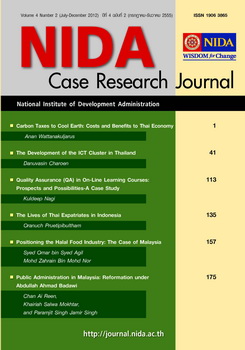Positioning the Halal Food Industry: The Case of Malaysia
Keywords:
Malaysia, Halal, Halal Food Industry, Halal Industry Master PlanAbstract
Abstract
Malaysia is committed towards developing and promoting its halal food industry as clearly indicated in her Third Industrial Master Plan (IMP3) and the Halal Industry Master Plan launched in 2006 and 2008 respectively. In line with the plans, the Malaysia is focusing on increasing the local food production as well as developing her potential as a global halal food hub.
Estimates have shown that there are as many as 1.8 billion Muslims in the world and they are increasingly becoming more educated, earned higher income and thus having higher halal consumptions. On the other hand, more non-Muslims are consuming eat halal food too. Recent estimates as to the value of the global halal food market showed a considerable increase from USD587.2 billion in 2004 to USD641.5 billion in 2010.
In developing and promoting Malaysia’s halal food industry, several strategies have been employed including improving the access to raw materials, developing the Halal Parks, improving the halal logistics services, enhancing halal related R&D, increasing the awareness on Malaysia as the center for halal products and services, promoting Malaysia Halal Standard, ensuring halal product quality and food safety, and building capacity.
However, there are challenges still as Malaysia continue her drive towards growing her halal food industry, including stiff competition fromcountries like Thailand, India and Australia, lack of halal certification standardization, shortage of raw materials, changing taste and demand of consumers, misunderstanding from the non Muslim societies and food safety and hygiene etc.
This case is on how Malaysia positions her halal food industry in the global market and maintains her halal food industry’s competitiveness. How well has Malaysia’s food industry performed and how is Malaysia going to position itself going forward?





